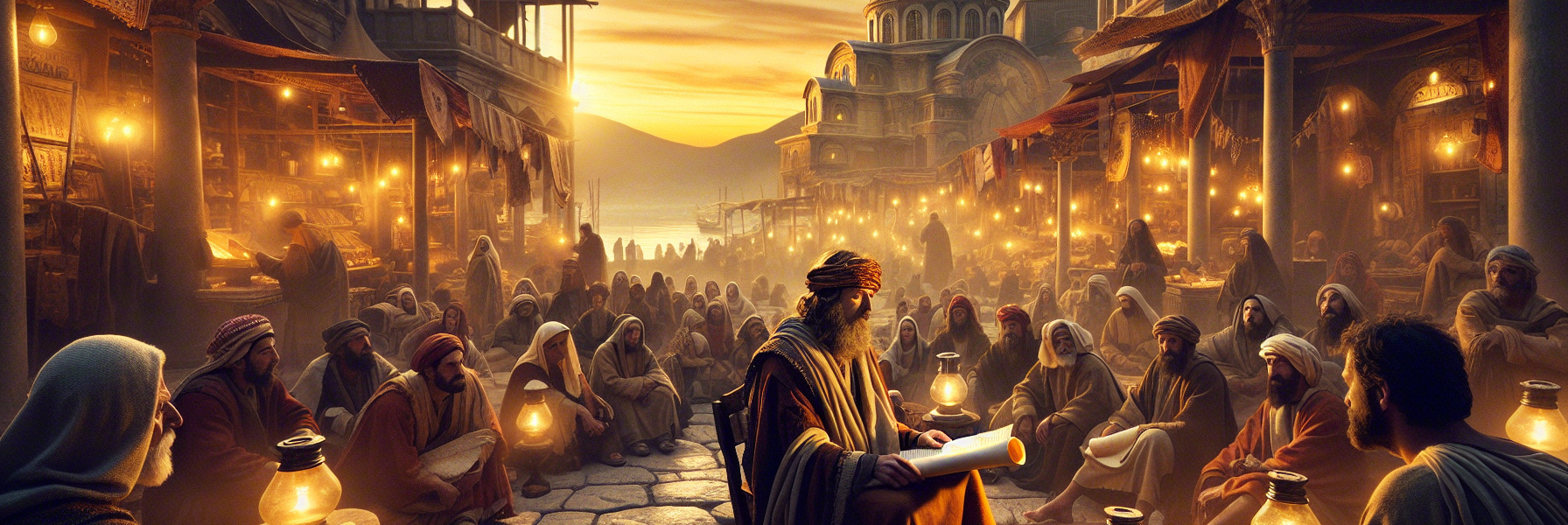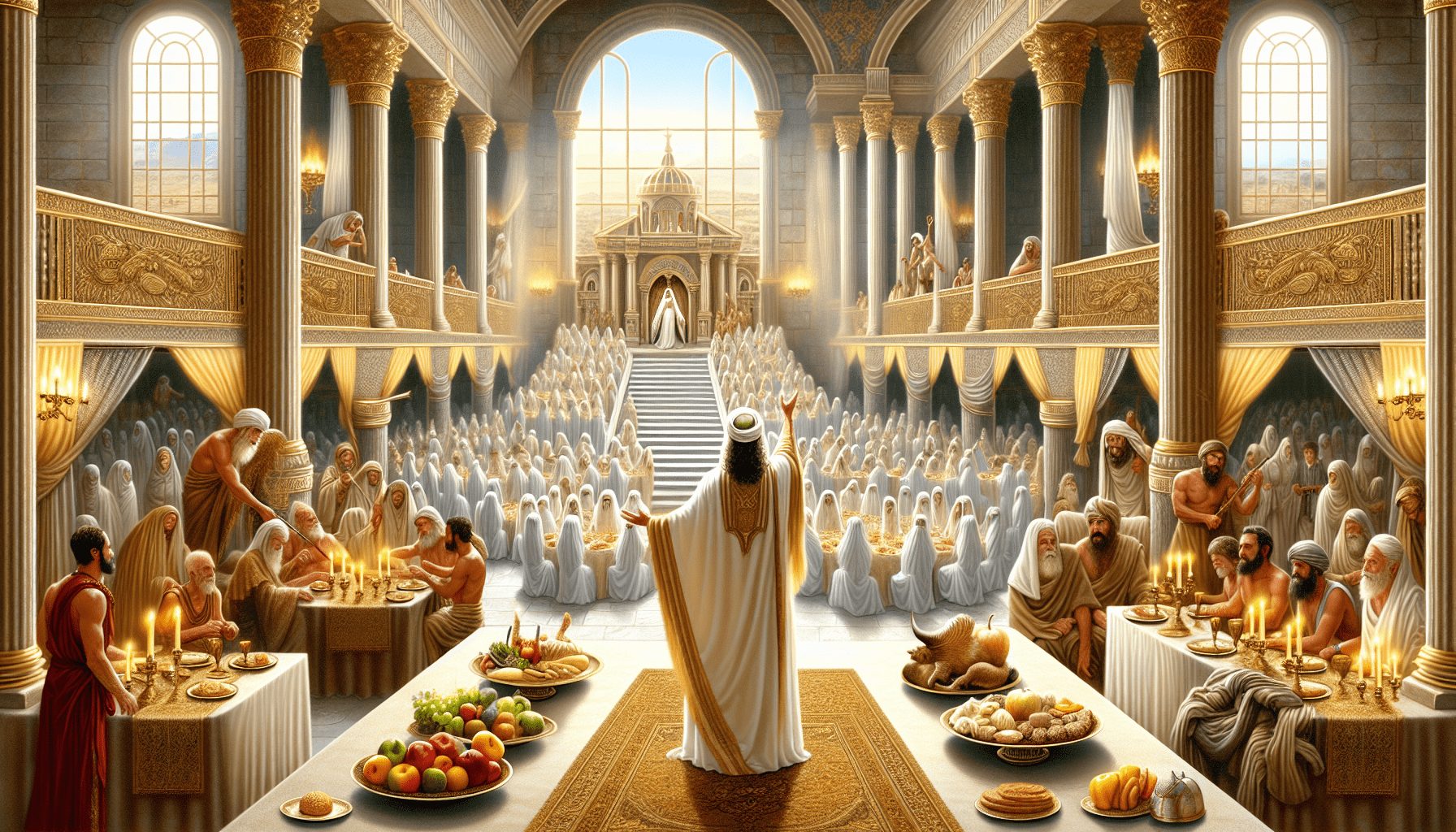**The Call to Prayer and God’s Desire for All to Be Saved**
The sun hung low over the city of Ephesus, casting long shadows across the bustling marketplace. The air was thick with the scent of spices, the murmur of merchants haggling, and the distant sound of waves lapping against the harbor. In a quiet corner of the city, a small group of believers gathered in the home of a wealthy patron, their hearts eager for the wisdom of their teacher, Paul. The aging apostle, his face lined with years of hardship and divine encounters, sat among them, his presence commanding reverence.
Clearing his throat, Paul unrolled a scroll, his fingers tracing the words he had penned with such care. The flickering oil lamps cast a warm glow over the parchment as he began to speak.
“First of all, then,” Paul declared, his voice steady and earnest, “I urge that supplications, prayers, intercessions, and thanksgivings be made for all people.” His words carried the weight of divine authority, and the room fell silent.
A woman named Lydia, her hands folded in her lap, leaned forward. “For all people, Apostle? Even those who oppose us?”
Paul met her gaze, his eyes filled with compassion. “Yes, Lydia. For kings and all who are in high positions, that we may lead a peaceful and quiet life, godly and dignified in every way.” He paused, letting the instruction settle in their hearts. “This is good, and it is pleasing in the sight of God our Savior.”
A murmur of understanding passed through the room. The believers had lived under the rule of emperors who did not acknowledge Christ, yet Paul was calling them to pray even for those rulers.
A young man named Timothy, Paul’s beloved disciple, listened intently, his stylus poised over a wax tablet. He had seen the persecution believers faced, yet here was Paul, teaching them to respond not with rebellion, but with prayer.
Paul continued, his voice softening yet growing more fervent. “God desires all people to be saved and to come to the knowledge of the truth.” His words seemed to hang in the air, charged with divine hope. “For there is one God, and there is one mediator between God and men, the man Christ Jesus, who gave Himself as a ransom for all.”
The room was utterly still. The truth of Christ’s sacrifice—a ransom not just for a select few, but for all—was overwhelming. A freed slave named Onesimus, his wrists still bearing the faint marks of chains, bowed his head, tears welling in his eyes. If Christ had died even for him, a once-worthless bondsman, then surely no one was beyond redemption.
Paul’s voice grew stronger. “This is the testimony given at the proper time. For this I was appointed a preacher and an apostle—I am telling the truth, I am not lying—a teacher of the Gentiles in faith and truth.”
The believers exchanged glances, their hearts stirred. They had been chosen to carry this message of hope to a world lost in darkness.
Then Paul turned his attention to the conduct of men and women in worship. “I desire then,” he said, “that in every place the men should pray, lifting holy hands without anger or quarreling.” He looked pointedly at a few men known for their heated disputes. “Our prayers must not be hindered by division.”
Next, his gaze rested on the women. “Likewise also,” he continued gently but firmly, “that women should adorn themselves in respectable apparel, with modesty and self-control, not with braided hair and gold or pearls or costly attire, but with what is proper for women who profess godliness—with good works.”
A wealthy matron named Claudia shifted uncomfortably, her fingers brushing the intricate gold bracelet on her wrist. Paul’s words were not a condemnation of beauty, but a call to prioritize the inward adornment of a heart devoted to God.
Then, with great care, Paul addressed another matter. “Let a woman learn quietly with all submissiveness. I do not permit a woman to teach or to exercise authority over a man; rather, she is to remain quiet.”
Some of the women exchanged glances, but there was no resentment—only a desire to understand. Paul’s instruction was not meant to diminish their worth but to uphold the order God had established.
“For Adam was formed first, then Eve,” Paul explained. “And Adam was not deceived, but the woman was deceived and became a transgressor. Yet she will be saved through childbearing—if they continue in faith and love and holiness, with self-control.”
The words were sobering, yet filled with grace. Eve’s fall had brought consequences, but in Christ, there was redemption—even through the very pain of childbirth, a reminder of both the curse and the hope of salvation.
As the meeting drew to a close, the believers sat in reflective silence. The world outside was full of chaos—idolatry, oppression, and sin—but here, in this humble gathering, they had been reminded of God’s heart: a desire for all to be saved, a call to prayer, and a life of holiness.
Timothy rolled up the scroll, his mind already turning over how to impart these truths to the church. The night air was cool as the believers departed, their hearts burning with a renewed sense of purpose.
For in a world that sought power through wealth and dominance, they had been called to something greater—prayer, humility, and the proclamation of Christ, the one Mediator who had ransomed them all.
And so, with quiet determination, they stepped back into the streets of Ephesus, ready to live out the sacred charge entrusted to them.



